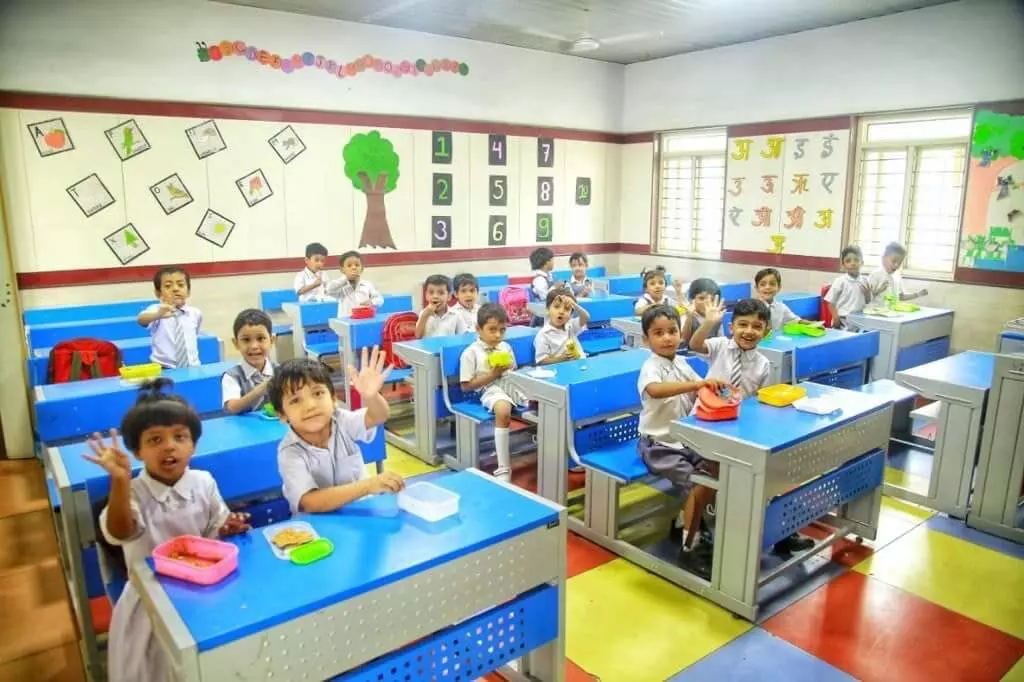Nurturing the roots
Numerous provisions enshrined in the NEP 2020 hold potential to foster children’s abilities through a holistic learning experience at the foundational stage

The National Education Policy (NEP) 2020 has set the stage for crucial reforms in the education sector. Many path-breaking initiatives have been undertaken in line with the recommendations of NEP 2020 under the inspirational leadership of Prime Minister Narendra Modi. A national mission on foundational literacy and numeracy — National Initiative for Proficiency in Reading with Understanding and Numeracy (NIPUN Bharat) — was launched with the aim to impart foundational literacy and numeracy to each child by class 3 by 2026-27.
National Initiative for School Heads’ and Teachers' Holistic Advancement (NISHTHA) for foundational learning was launched to build the capacity of teachers teaching at pre-primary to primary grade. A three-month school preparation module named ‘Vidya Pravesh’ has been developed for students entering Grade 1, to familiarise children with the school environment and to ease their entry to the wide world of education. This would help bridge the gap for those children who had no earlier experience of pre-schooling. For the first time, Balvatika has been introduced in 49 KendriyaVidyalayas, in pilot-mode, to lay a strong foundation for early grades.
Another major paradigm shift, as envisioned by NEP 2020, has been to restructure the pedagogical framework of 5+3+3+4 (foundational, preparatory, middle, and secondary levels), which will provide roadmap for the four stages of school education and, accordingly, move towards a new curriculum. On October 20, 2022, the government launched the first-ever integrated curriculum framework for children between ages 3-8 in India, i.e., ‘National Curriculum Framework for Foundational Stage’ (NCF-FS). NCF-FS is based on extensive research in the area of foundational education from across the world. It draws insights from the fields of neurosciences, brain study, and cognitive sciences.
Furthermore, to ensure participation of each and every citizen of the country in this futuristic curriculum development process, a citizen-centric Digital Survey for National Curriculum (DiSaNC) was launched. This was the first time in the country when such a massive and intensive public consultation process with multiple stakeholders took place by reaching every corner of the country to get inputs in the making of NCF.
NCF-FS emphasises on play-based and story-based approach at the foundational stage. It recognises the fact that children learn best through play. Therefore, learning envisaged by the framework will provide stimulating experiences for the child's development in all dimensions – cognitive, social-emotional, physical, and will also enable the achievement of foundational literacy and numeracy for all our children.
Innovative pedagogy, technology, and play-based education will bring new approaches in the teaching-learning process. Following the recommendations of NEP 2020, the framework also emphasises on the virtue of mother tongue as the primary medium of instruction.
By the time children join pre-school, they will acquire significant competence in their “home language”. Since children learn concepts most rapidly and deeply in their home language, the primary medium of instruction would optimally be the child’s home language/mother tongue/ familiar language in the foundational stage.
Focusing on cognitive development and socio-emotional stimulation in the early years of a child, the new framework has listed the ‘Panchakosha Vikas’ (Five-fold Development) concept for the education of children between the age of 3-8 years. ‘Panchakosha’ is an ancient expression of the importance of the body-mind complex in human experience and understanding.
This non-dichotomous approach to human development gives clear pathways and direction towards a more holistic education. The concept's five layers are physical development (sharirikvikas), development of life energy (pranikvikas), emotional and mental development (manasikvikas), intellectual development (bauddhikvikas) and spiritual development (atmikvikas).
In order to implement the NCF-FS in letter and spirit, a ‘Jaadui Pitara’ was launched on February 20, 2023, by the Ministry of Education and NCERT. The Pitara has been developed as an exemplar of content that should be used by schools for learning at the foundational stage. For the first time, a separate ‘Learning-Teaching Material’ for the foundation stage, particularly for Balvatika, has been developed in the form of a play and activity book along with a teacher's handbook. The Indian knowledge system has been directly integrated into the curriculum and the learning-teaching material of the foundation stage in an interesting manner.
The Pitara contains toys, games, puzzles, puppets, posters, flashcards, story cards, playbooks for students, and handbooks for teachers. Digital versions of the handbooks, playbooks, posters, and flashcards are available at PM e-vidya Diksha (www.diksha.gov.in) for free download. Each of the handbooks have instructions for the teachers, which further describes the spirit behind such content. State education departments are encouraged to develop a similar set of materials that is context-based, and in mother tongue, for the foundational stage.
Both NCF-FS and Jadui Pitara aim to equip young minds with cognitive and linguistic competencies of the 21st-century skills, such as creativity and critical thinking. This approach is expected to have a significant impact on the education and overall well-being of children. It is a pathway for building future global adults who will shoulder the responsibility of humanity.
More significantly, this will enable a paradigm shift in the teaching-learning process of the classroom to adopt a student-centric, teacher-led approach. Subsequently, the NCF-FS will be an integral part of the overall curriculum framework for school education, which is under development. Fostering children’s abilities through a holistic learning experience not only transforms the individual, but also has the capacity to empower the society and nation, leading to socio-economic progress. Hopefully, this will strengthen the foundational stage that will shape the future of our children.
Archana Sharma Awasthi (IRS) is Joint Secretary and Purabi Pattanayak is Principal Chief Consultant in the Department of School Education and Literacy, Ministry of Education. Views expressed are strictly personal



